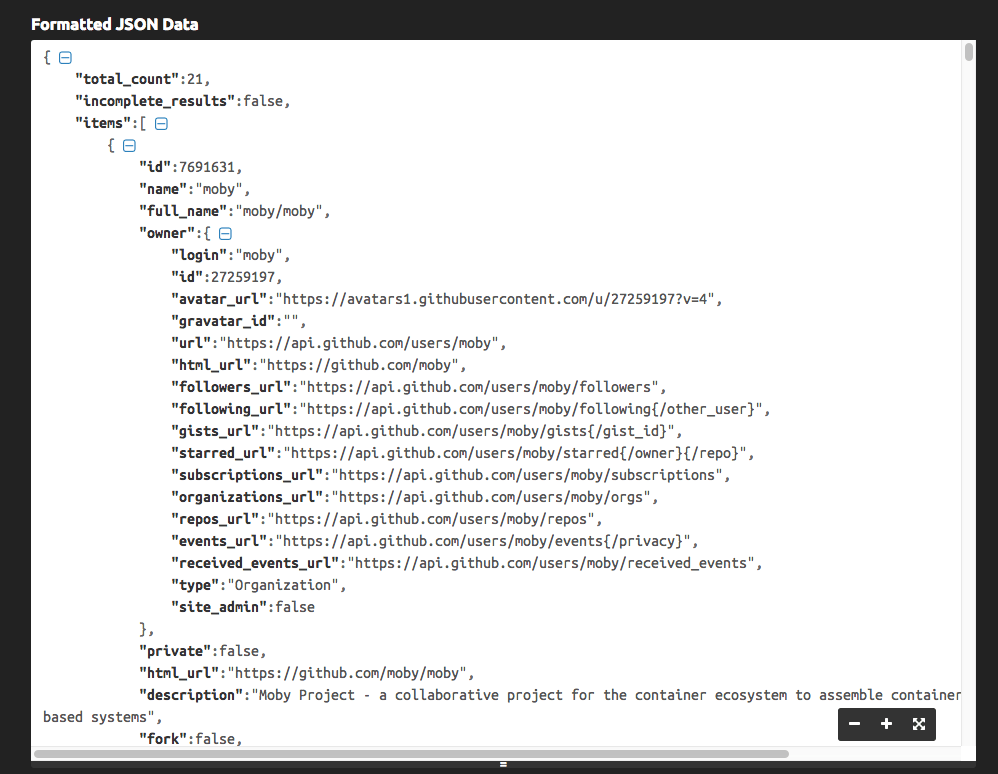Use Go to get a list of repositories from GitHub
In this post I’m going to ask to the GitHub API information about public repositories, using just the Go net/http stdlib package, without any additional library.
GitHub has a nice public API called Search, which you can inspect at https://developer.github.com/v3/search/#search-repositories.
In particular, I’m interested in getting the Go repos with more than 10k stars at this point in time.
We can pass it a query to get exactly what we want. Looking at the Search API docs we’ll have to make an HTTP GET request to https://api.github.com/search/repositories passing the query ?q=stars:>=10000+language:go&sort=stars&order=desc: give me the repositories with more than 10k stars, with language Go, sort them by number of stars.
Simplest snippet: we use http.Get from net/http and we read everything that’s returned using ioutil.ReadAll:
package main
import (
"io/ioutil"
"log"
"net/http"
)
func main() {
res, err := http.Get("https://api.github.com/search/repositories?q=stars:>=10000+language:go&sort=stars&order=desc")
if err != nil {
log.Fatal(err)
}
body, err := ioutil.ReadAll(res.Body)
res.Body.Close()
if err != nil {
log.Fatal(err)
}
if res.StatusCode != 200 {
log.Fatal("Unexpected status code", res.StatusCode)
}
log.Printf("Body: %s\n", body)
}

It’s not much readable, as you can see. You can paste what you get using an online formatter to understand the actual structure.

Let’s now process the JSON and generate a nice table from it.
If you’re new to the JSON topic, check out my preliminary guide on how to process JSON with Go.
package main
import (
"encoding/json"
"fmt"
"io/ioutil"
"log"
"net/http"
"os"
"text/tabwriter"
"time"
)
// Owner is the repository owner
type Owner struct {
Login string
}
// Item is the single repository data structure
type Item struct {
ID int
Name string
FullName string `json:"full_name"`
Owner Owner
Description string
CreatedAt string `json:"created_at"`
StargazersCount int `json:"stargazers_count"`
}
// JSONData contains the GitHub API response
type JSONData struct {
Count int `json:"total_count"`
Items []Item
}
func main() {
res, err := http.Get("https://api.github.com/search/repositories?q=stars:>=10000+language:go&sort=stars&order=desc")
if err != nil {
log.Fatal(err)
}
body, err := ioutil.ReadAll(res.Body)
res.Body.Close()
if err != nil {
log.Fatal(err)
}
if res.StatusCode != http.StatusOK {
log.Fatal("Unexpected status code", res.StatusCode)
}
data := JSONData{}
err = json.Unmarshal(body, &data)
if err != nil {
log.Fatal(err)
}
printData(data)
}
func printData(data JSONData) {
log.Printf("Repositories found: %d", data.Count)
const format = "%v\t%v\t%v\t%v\t\n"
tw := new(tabwriter.Writer).Init(os.Stdout, 0, 8, 2, ' ', 0)
fmt.Fprintf(tw, format, "Repository", "Stars", "Created at", "Description")
fmt.Fprintf(tw, format, "----------", "-----", "----------", "----------")
for _, i := range data.Items {
desc := i.Description
if len(desc) > 50 {
desc = string(desc[:50]) + "..."
}
t, err := time.Parse(time.RFC3339, i.CreatedAt)
if err != nil {
log.Fatal(err)
}
fmt.Fprintf(tw, format, i.FullName, i.StargazersCount, t.Year(), desc)
}
tw.Flush()
}
The above code creates 3 structs to unmarshal the JSON provided by GitHub. JSONData is the main container, Items is a slice of Item, the repository struct, and inside item, Owner contains the repository owner data.
Given the HTTP response res returned by http.Get we extract the body using res.Body and we read all of it in body with ioutil.ReadAll.
After checking the res.StatusCode matches the http.StatusOK constant (which corresponds to 200), we unmarshal the JSON using json.Unmarshal into our JSONData struct data, and we print it by passing it to our printData struct.
Inside printData I instantiate a tabwriter.Writer, then process and format the JSON data accordingly to output a nice table layout:

→ I wrote 17 books to help you become a better developer:
- C Handbook
- Command Line Handbook
- CSS Handbook
- Express Handbook
- Git Cheat Sheet
- Go Handbook
- HTML Handbook
- JS Handbook
- Laravel Handbook
- Next.js Handbook
- Node.js Handbook
- PHP Handbook
- Python Handbook
- React Handbook
- SQL Handbook
- Svelte Handbook
- Swift Handbook
Also, JOIN MY CODING BOOTCAMP, an amazing cohort course that will be a huge step up in your coding career - covering React, Next.js - next edition February 2025